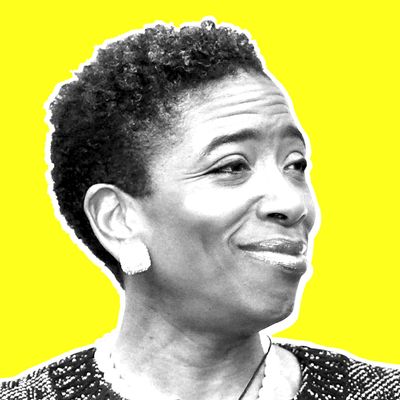
Young women have been told for years that they need to find a mentor to guide them through the complexities of their career. Lately, that advice has expanded to encourage people to find a sponsor, too — which is sort of like a mentor, only with more power. This sounds great, but actually landing a mentor or sponsor seems really difficult, not least because powerful people are usually very busy. We asked Carla Harris, a vice-chairman at Morgan Stanley and presidentially appointed chair of the National Women’s Business Council, to tell us how we can get a woman like her to invest in us.
The first thing you have to understand is the difference between a mentor and a sponsor. A mentor must be somebody that you trust. And it must be somebody who knows you very well. You shouldn’t call someone your mentor because “Oh, Carla has been doing this for 20 years, she’s successful.” If she does not know you well, she can’t be a good mentor to you. A mentor’s job is to give you advice that is tailored specifically to you and to your career aspirations. They do not need to be within your organization, nor do they need to look like you. But they must understand your context. Some of my best mentors have been peers.
Frankly, you can survive a very long time in your career without a mentor. But you will not ascend in any organization without a sponsor. A sponsor is the person who, behind closed doors, will argue passionately on your behalf as to why you should get the great promotion, why you should get the outstanding bonus, why you should get that next-stretch opportunity. So, how do you find a great sponsor?
The profile of a great sponsor is somebody who is internal to your organization, for one. Two, they have exposure to your work. The third criterion is they have to have a seat at the decision-making table. And the fourth criterion is they have to have the juice. They have to have the power to get it done — whatever “it” happens to be for you, whether it’s the promotion, the next great assignment, the good bonus.
Think about someone who has that profile, and then start to build a relationship with that person. Make sure that you have conversations with that person, and that you get an opportunity to talk about what you’re working on. In a nirvana world, somebody pulls you under their wing and tells you that they are prepared to advocate for you. But nirvana doesn’t happen to all of us. And sometimes you must ask someone to be your sponsor.
I found a sponsor because I asked someone. Early in my career, I realized that I was up for a critical promotion and I couldn’t answer the question: Who is going to pound the table to make sure I get this big promotion? So, I asked someone to do that for me. In the beginning, the person sort of went, “Hmm, hrr, ummm.” But then he said yes. And I trusted that he would get it done.
Now I’ve been speaking about these issues for 20 years. I don’t have many people coming to me asking for sponsorship — I might not have direct exposure to their work, so I’m not the right person to sponsor. I will advise almost anyone. But I am much more discerning about the people that I will actually mentor. If someone comes up to me, which often happens after I give a speech, and says, “Can you be my mentor?” I say, “No, I can’t, because I’m just meeting you. I can advise you, but the only way I can truly mentor is if there’s an opportunity for us to develop a relationship.” Which is a little tough given my current schedule.
The No. 1 criterion for me in terms of people I mentor is whether a person is willing to do it for somebody else. If I’m going to invest the time with you, if I am going to get up at 6 a.m. on my way to the airport and call you about an issue you might have, I have to feel comfortable that when somebody calls you at six in the morning that you’re going to do the same thing for them. I also look for someone who has courage to follow the advice. I can give you advice all day long, but at the end of the day, you’re the one that has to have the courage to take it. I’d say the third thing that I’m looking for is someone who has the ability to adapt and pivot quickly. Sometimes you might be on the wrong road, and the advice I might give you as a mentor will require an immediate shift.
I don’t think that asking someone to be a mentor or sponsor makes you seem disingenuous at all. People struggle with the active nature of asking for sponsorship, because all of us wish somebody would just take us under their wing and shepherd us along. But when that relationship doesn’t just happen, if you are in any environment — whether it’s a nonprofit, whether it is new media, whether it is technology — you must speak up. You are the one who is responsible for your own career, so it’s your responsibility to ask.





